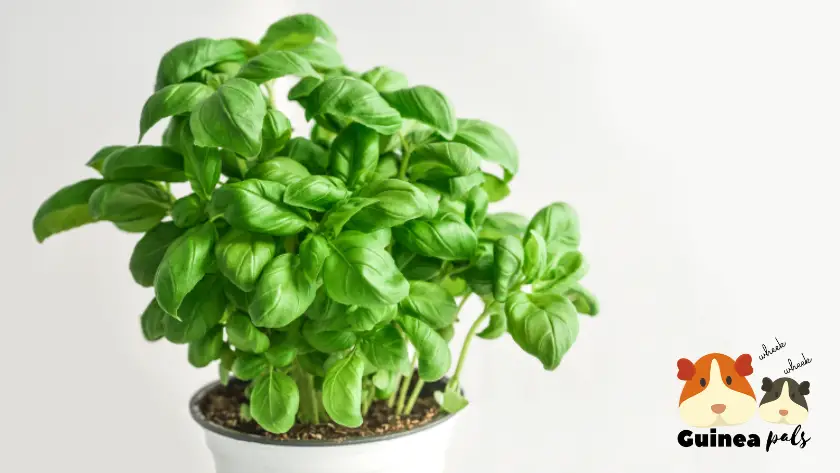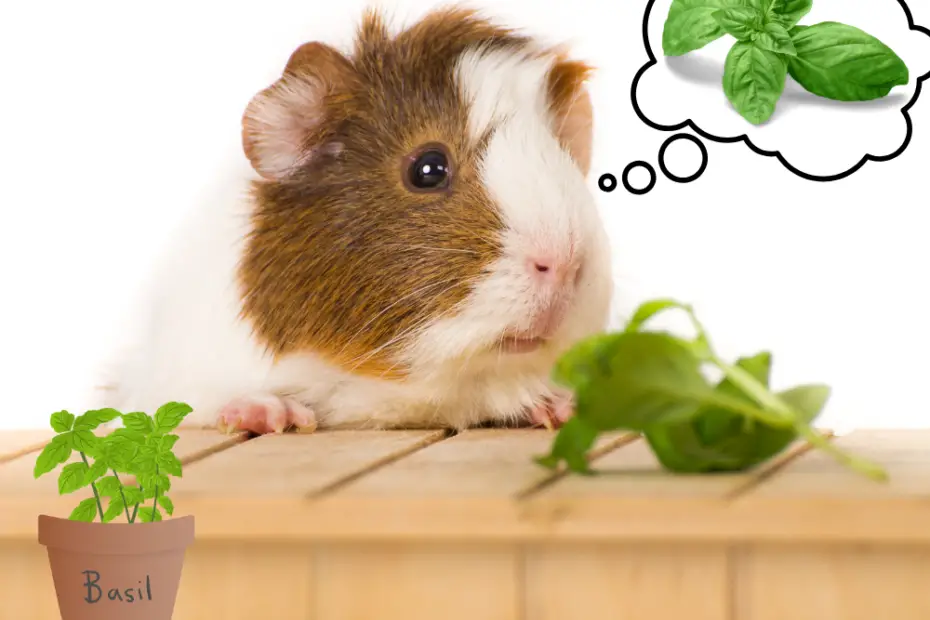Basil, with its fragrant leaves and distinct flavor, is a popular herb in many cuisines around the world. But is it safe for our beloved guinea pigs? Let’s delve into the details and find out!
Is basil safe for guinea pigs to eat?
Yes, basil is generally safe for guinea pigs to eat. In fact, it can be a flavorful addition to their diet when fed in moderation. However, as with any new food, it’s essential to introduce basil gradually and observe your guinea pig for any adverse reactions.
Guinea pig’s can eat basil, in fact, it contains a high amount of vitamins. This includes vitamin C, which is essential in preventing scurvy in guinea pigs.
A guinea pig’s diet should mainly consist of an unlimited supply of hay, 1/8th cup of pellets and 1 cup of fresh veggies and fruit every day.
Not all types of veggies and fruit can be served daily, that’s why you should know how much of each your guinea pig can eat.
Let’s take a closer look at basil.
What are the nutritional benefits of feeding basil to guinea pigs?
Basil is rich in vitamins and minerals that are beneficial for guinea pigs. It contains vitamin K, vitamin A, manganese, and antioxidants, which contribute to overall health and well-being. Additionally, basil is low in calories and can provide some variety to their diet.
Is basil good for guinea pigs?
Basil contains a lot of vitamins and fiber and a low amount of calories, making it a great snack for over weight piggies or those who have diabetes.
Can basil be a regular part of a guinea pig’s diet?
While basil can be included as an occasional treat, it shouldn’t make up a significant portion of your guinea pig’s daily diet. It’s best to offer basil in small quantities a few times a week as part of a balanced diet that primarily consists of hay, fresh vegetables, and pellets.
Can basil be bad for guinea pigs?
Are there any risks or potential side effects associated with feeding basil to guinea pigs?
While basil is generally safe for guinea pigs, some may experience digestive upset if they consume too much or if their digestive systems are sensitive. Additionally, guinea pigs may develop allergies to certain foods, so it’s essential to monitor them closely when introducing basil for the first time.
Basil is completely safe for guinea pigs if fed in moderation.
Over feeding basil can cause an upset stomach and diarrhea which can lead to other health issues.
Too much basil can also cause gas, bloat and kidney or bladder stones which can cause further health issues if left untreated.
Can basil help with digestive issues or other health problems in guinea pigs?
Basil contains fiber, which can aid in digestion and help prevent constipation in guinea pigs. However, it’s not a cure-all for digestive issues, and it’s essential to consult a veterinarian if your guinea pig is experiencing any health problems.
Over feeding basil can cause an upset stomach and diarrhea which can lead to other health issues.
Too much basil can also cause gas, bloat and kidney or bladder stones which can cause further health issues if left untreated.
How much basil should I feed my guinea pig?
When offering basil to your guinea pig, moderation is key. A few small leaves a couple of times a week should suffice. Remember to monitor your guinea pig’s intake and adjust accordingly based on their individual preferences and digestive health.
Basil is considered more as a treat than a daily staple. A guinea pig can eat about 2 basil leaves, 1 to 2 times a week.

Are there different varieties of basil that are safe for guinea pigs?
Yes, there are various types of basil, including sweet basil, Thai basil, and lemon basil, among others. All these varieties are safe for guinea pigs to consume, but it’s essential to avoid any flavored or seasoned basil, as these may contain additives that could be harmful to your pet.
What should I do if my guinea pig shows signs of allergic reaction after eating basil?
If your guinea pig exhibits symptoms such as itching, swelling, or difficulty breathing after consuming basil, it’s crucial to remove the food immediately and contact your veterinarian. Allergic reactions can be serious and require prompt medical attention.
Can guinea pigs eat dried basil?
Guinea pigs cannot eat any dry basil at all.
Can guinea pigs eat cooked basil?
Guinea pigs cannot eat any cooked food and basil is no exception. Guinea pigs can’t digest cooked basil, it can lead to gas, bloat and an upset stomach.
Can guinea pigs eat purple basil?
Purple basil is safe for guinea pigs to eat, but in moderation.
How should I prepare basil for my guinea pig?
Before offering basil to your guinea pig, be sure to wash it thoroughly to remove any pesticides or dirt. You can then tear the leaves into smaller pieces or offer them whole, depending on your guinea pig’s preference. Avoid adding any dressings or seasonings.
- Only serve fresh, raw basil leaves to your guinea pigs.
- Wash basil thoroughly to remove any possible pesticides.
- Serve about 2 basil leaves to your guinea pig.
- Watch them enjoy it.
Are there any other herbs or greens that I can feed my guinea pig along with basil for a balanced diet?
Yes, there are plenty of other safe fruits, vegetables, and herbs that you can offer your guinea pig to ensure they receive a balanced diet. Some options include bell peppers, carrots, cilantro, and parsley. Just be sure to research each food item before introducing it to your guinea pig’s diet.
Conclusion
In conclusion, basil can be a tasty and nutritious addition to your guinea pig’s diet when offered in moderation. By following these guidelines and monitoring your pet’s health and preferences, you can ensure they enjoy a happy and healthy life.

